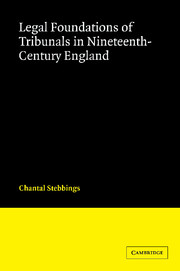Book contents
- Frontmatter
- Contents
- Acknowledgements
- Table of statutes
- Table of cases
- List of abbreviations
- 1 Challenges to the legal process
- 2 The ideological and theoretical context
- 3 Composition and personnel
- 4 Jurisdiction and functional powers
- 5 Procedure and practice
- 6 Judicial supervision
- 7 Principles, place and perception
- Index
5 - Procedure and practice
Published online by Cambridge University Press: 02 December 2009
- Frontmatter
- Contents
- Acknowledgements
- Table of statutes
- Table of cases
- List of abbreviations
- 1 Challenges to the legal process
- 2 The ideological and theoretical context
- 3 Composition and personnel
- 4 Jurisdiction and functional powers
- 5 Procedure and practice
- 6 Judicial supervision
- 7 Principles, place and perception
- Index
Summary
The new regulatory legislation of the nineteenth century was rarely popular. It undoubtedly and invariably addressed a clear and acknowledged evil, and as such was welcomed by that sector of society with humanitarian beliefs its members were prepared to act on, and by that sector which suffered under the evils the legislation was designed to remove. There remained, however, a large proportion of the public who had no real ideological or practical interest in the efficient implementation of the legislation, and others whose private interests were actively undermined by it. The government was thus faced with indifference or antipathy, and yet the prompt and effective implementation of the new policies embodied in the legislation was a social, economic or political necessity. To persuade the public to embrace the new legislation, the implementing bodies had to be attractive, and that meant easily accessible in terms of simplicity, cheapness, speed and proximity. The procedures had to be seen to ensure fairness, though the evidence suggests that the public were prepared to some extent to sacrifice the quality of justice if they could have the procedure they wanted. The Victorian age was one which valued individual independence and privacy and as such was particularly concerned with the machinery of implementation of the new legislation, often even more than with its substance. As was observed in relation to the new Railway Commission proposed in 1872, and reflecting popular views on the desirable attributes of the tribunal process, its proceedings were to be ‘as simple and inexpensive as is consistent with giving due notice and hearing questions openly and fairly’.
- Type
- Chapter
- Information
- Legal Foundations of Tribunals in Nineteenth Century England , pp. 184 - 228Publisher: Cambridge University PressPrint publication year: 2007



